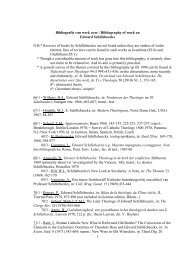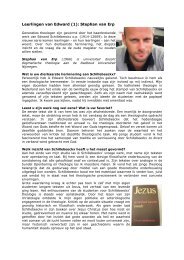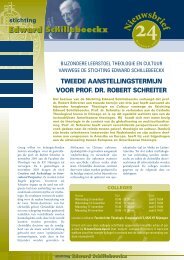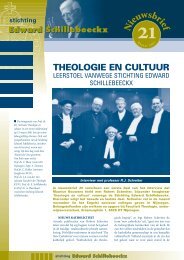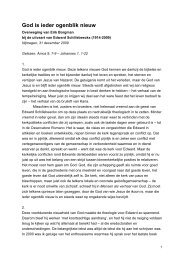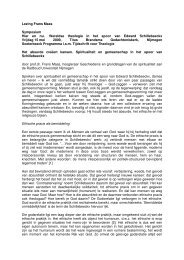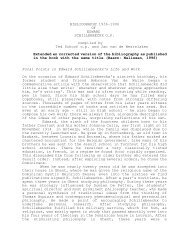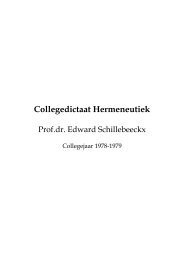Hans Hamers - Stichting Edward Schillebeeckx
Hans Hamers - Stichting Edward Schillebeeckx
Hans Hamers - Stichting Edward Schillebeeckx
You also want an ePaper? Increase the reach of your titles
YUMPU automatically turns print PDFs into web optimized ePapers that Google loves.
<strong>Schillebeeckx</strong> says that the constant of a utopian element in man’s consciousness seems<br />
fundamental and is embraced by man to make sense of contingency or finitude, suffering<br />
etc. and to overcome this. <strong>Schillebeeckx</strong> sees this as a specific form of the hermeneutical<br />
process in everyday life which “looks for another social system and another future against<br />
the existing attribution of ‘meaning’. These are comprehensive approaches which teach us<br />
to experience human life and society, now or in the future, as good , meaningful and happy<br />
totality of man – a vision and a way of life which seek to give meaning and context to human<br />
existence in this world (even if only in a distant future).” 3 All embracing views as religions<br />
and non-religious world views, general theories of life, functioning as cognitive models of<br />
reality interpreting nature, history of mankind and making it to be experienced as<br />
meaningful, and ‘yet to be realized’.<br />
In religions the living God is the all overarching principle, beyond the personal realm of life.<br />
It is the ground for hope, which is an anthropological constant throughout human history:<br />
“That implies that faith and hope – whatever their content – are part of the health and<br />
integrity, the worthwhileness and ‘wholeness’ of our humanity.” 4 Religion makes no sense<br />
when human salvation, redemption and true liberation are impossible. Religious redemption<br />
is a condition sine qua non for total liberation of man.<br />
Above the central theological notions are mentioned which are relevant within the scope of<br />
this paper. The line of this paper will be: firstly, the ground base of mankind, humanity,<br />
human existence, will be shown through the anthropological constants. Secondly, the<br />
concepts of suffering and negative contrast experience are discussed.<br />
Thirdly I will try to draw some conclusion on the relation between <strong>Schillebeeckx</strong>’ theology<br />
and the practice of spiritual care.<br />
2 Humanity<br />
The theology of <strong>Schillebeeckx</strong> is heavily based on the humanum, the experiences of man in<br />
this world. The conversation partner of the theologian is not the non-believer, but the fellow<br />
man that is despised, oppressed and marginalized, suffering not for a good cause, but simply<br />
suffering from something. Grace and salvation comes into play when it is said that God is<br />
there for all men, and cares for all men. Therefore I start with an overview of the theological<br />
anthropology of <strong>Schillebeeckx</strong>, more particular the so called anthropological constants as<br />
presented in the Christ-book. <strong>Schillebeeckx</strong> considers these constants as universal for<br />
mankind, a system of coordinates to think about man and his salvation, his status, and about<br />
humanity as a whole. 5<br />
3 Ibid. p. 740<br />
4 Ibid. p. 741<br />
5 Ibid. pp. 650, 652<br />
3



